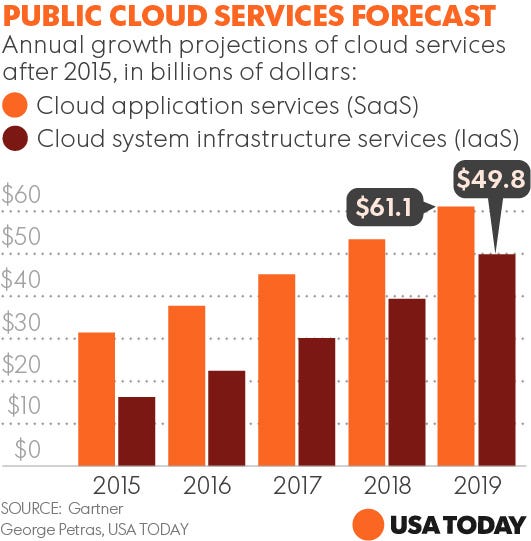SAN FRANCISCO — The cloud wars are beginning to thunder.
Once largely a solution for start-ups that couldn’t afford to build out and maintain computing infrastructure, the cloud is fast becoming a cost-effective way for large corporations to manage their digital lifeblood.
A survey from research firm IDC last month found that 58% of companies planned to use web-based cloud services, up from 24% in last 2014.
The stakes are high: As more companies realize the benefits of shifting software and data off their own computers, tech heavyweights and their smaller cloud-focused competitors are battling more aggressively for these clients.
So are the spoils: Cloud spending in 2015 hit $175 billion and is projected to top $315 billion by 2019, according to Gartner.
With dozens of cloud companies large and small vying for business, “there isn’t room for everyone,” says Lydia Leong, Gartner’s cloud analyst. “Amazon’s number one, Microsoft’s got good intellectual property and Google is coming on strong. But for many other companies, it’s been a litany of missed earnings as the threat of the cloud was underestimated.”
The generals in this battle are among the most vaunted names in tech, including Amazon’s Jeff Bezos, Microsoft CEO Satya Nadella and Google’s new cloud boss Diane Greene.
Michael Dell got in the game by offering $67 billion for EMC, which includes cloud company VMware. At IBM, Ginni Rometty oversaw a 2013 purchase of SoftLayer Technologies. And onetime Oracle salesman Marc Benioff saw the future early, founding customer relationship management giant Salesforce in 1999. The company’s 18% market share made it the subject of a rumored $50 billion Microsoft acquisition bid.
The tactics in this tussle would be familiar to the average mobile phone customer: price cuts, promises of features, and offers of free switching.
Larry Ellison, now executive chairman at database software pioneer Oracle, recently shrugged off brazen Microsoft and Amazon plays for its licensed software business (“Break free from Oracle,” reads the pitch on Microsoft’s site) as Oracle itself pivots to the cloud.
“People are coming after us because we are, by far, the market leader in database,” said Ellison on the company’s recent earnings call.
CLOUD’S TOP PLAYERS GET TOUGH
Ellison would do well to stake out his turf. Gartner’s survey notes that the most lucrative cloud sector will be software as a service (SaaS), where licensing fees are paid to companies such as Oracle and Salesforce to access their software in the cloud. SaaS sales will double to $61 billion in 2019.
Next in line is infrastructure as a service (IaaS), which is a bit like a utility. A company such as Amazon or Microsoft will host a client’s computing infrastructure and charge based on metered usage. IaaS sales will triple to nearly $50 billion by 2019, says Gartner.
Expect the tough talk and enticing deals to grow as the war for cloud clients intensifies, especially among three well-known Internet players:
– After rolling back cloud prices in January, Amazon Web Services, cloud computing leader for a decade now, recently unveiled a Database Migration Service aimed at enticing enterprises to make the switch to the cloud.
“Our general approach is, don’t tell, show,” says Matt Wood, general manager of product strategy for AWS. “Last year, we had over 700 new feature and service announcements, and that’s on top of over 500 the year before.”
– Microsoft’s steady advances with its storage and services unit Azure finds it creeping up on its Seattle-area cloud rival, now with 10% of global market share to Amazon’s 30%, according to Synergy Research Group. Nadella’s cloud-first strategy involves mining existing Office-based relationships and, recently, making it easier for companies running Linux-based software to use Azure.
“If I’m Coca-Cola, managing servers is not my core competency,” says Julia White, general manager for Microsoft’s cloud platform. “But if Coke wants to create a new soft drink and do that confidentially, we are maniacally focused on providing a range of infrastructure and software as well as security.”
– And Google Cloud chalked up a notable victory when reports surfaced last week that Apple would be shifting some of its business away from AWS and toward Google. Under the guidance of VMware co-founder Greene, who was hired last fall, Google plans to boost the number of its data centers from three to 15 in the next 18 months.
The big push now isn’t just to pitch the cloud as a giant data storage locker but rather a massive brain that can crunch valuable information, says Forrester Researchanalyst Dave Bartoletti.
“The battle is on now to get companies to move their applications and their data,” he says. “The message is, ‘We’re the easiest place to store your core data, and once we get it, look at all the exciting tools that can offer better insights, better sales opportunities and deeper intelligence.'”
CLOUD STILL IN ‘BLACKBERRY DAYS’
Despite all this competitive churn, most analysts and cloud execs say these are still early days for cloud adoption (White calls it the “Blackberry days” of the cloud.) They note that a growing preference for a hybrid cloud approach, or spreading computing needs across various services, will keep many companies of different stripes vital in the short run.
“It’s tempting to announce a winner in the cloud wars, but it’s not game over,” says Vishy Padmanabhan, a partner in Bain & Company’s information technology practice. “Adoption in 10 years’ time will be much bigger.”
Padmanabhan says the sheer breadth of corporate clients moving to cloud providers is so broad that “it allows for niche players such as Box and Dropbox to play a role. People won’t use one company for all their data.”
A recent survey by RightScale, a cloud portfolio management company, revealed that 82% of its enterprise clients use a multi-cloud strategy, with Amazon leading the list of providers followed by Microsoft and Google.
“The more vendors, the better an enterprise company’s negotiating power,” says RightScale’s Kim Weins. “It’s Verizon versus AT&T versus T-Mobile right now. It’s about who’s got the best deal since there’s a similar functionality.”
But as much as these cloud wars will continue to be stoked by competition, the biggest battle — a seismic attitudinal shift — appears to have already been won.
“For the longest time, cloud companies were threatening to in-house IT teams, who met their encroachment with resistance,” says Forrester’s Bartoletti. “But in the last three years, IT stopped fighting the cloud.”
In fact, he notes that some companies are even willing to pay competitors for their services if it makes their lives easier, much as streaming service Netflix pays its streaming competitor Amazon to house its video library on AWS.
Says Bartoletti: “Everyone’s getting cloud religion.”












